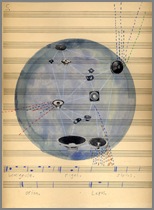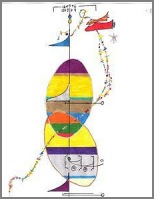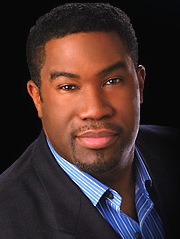 My first year in college (1974-5), we were treated to an exhibition of the original score pages selected by John Cage and Alison Knowles for their highly influential 1969 book Notations (currently available as a free PDF download at UbuWeb).
My first year in college (1974-5), we were treated to an exhibition of the original score pages selected by John Cage and Alison Knowles for their highly influential 1969 book Notations (currently available as a free PDF download at UbuWeb).
For young composers at the time, these bits and pieces of anything-but-standard notation were eye- and ear-opening, sent us scouring the library stacks for more, and led us all to go a little crazy trying to mimic or out-write what we saw there.
Then as sequel this year, Theresa Sauer carried the idea up to our own time with Notations 21, an updated compendium of all the fruit that’s come from those first flowers.
 I’m mentioning this because down here in Houston I just received a little whiff of that wonderful déjà vu this afternoon. The Contemporary Arts Museum Houston has a show up and running through December 7th, titled Perspectives 163: Every Sound You Can Imagine. It’s kind of a mix of both Cage/Knowles-old and Sauer-new, with a scattering of more traditional scores by some of the recent “big names” (Lou Harrison, Rorem, Glass, Reich, Riley, Dresher, Adams — John and John Luther –, Bryars, Crumb, Nyman, etc.).
I’m mentioning this because down here in Houston I just received a little whiff of that wonderful déjà vu this afternoon. The Contemporary Arts Museum Houston has a show up and running through December 7th, titled Perspectives 163: Every Sound You Can Imagine. It’s kind of a mix of both Cage/Knowles-old and Sauer-new, with a scattering of more traditional scores by some of the recent “big names” (Lou Harrison, Rorem, Glass, Reich, Riley, Dresher, Adams — John and John Luther –, Bryars, Crumb, Nyman, etc.).
The list of old mingling with new is long: Steve Roden (image above right), Wadada Leo Smith (image left), Cage, Brown, Bussotti, Feldman, Ashley, Mumma, Brandt, Stockhausen (dad and son), Xenakis, Wolff, Dick Higgins, Knowles, Yasunao Tone, Subtonick, Cardew, Curran, Per Norgard, Phill Niblock, La Monte Young, Stephen Vitiello, Kaffe Mathews, Maja Ratkje, Nancarrow, Daniel Lentz, Elena Kats-Chernin, Jennifer Walshe, Stephen Scott, Wallace Berman, Marina Rosenfeld, Christian Marclay… etc., etc…. If your travels take you down this way, be sure to make room for a visit.
 My first year in college (1974-5), we were treated to an exhibition of the original score pages selected by John Cage and Alison Knowles for their highly influential 1969 book Notations (currently
My first year in college (1974-5), we were treated to an exhibition of the original score pages selected by John Cage and Alison Knowles for their highly influential 1969 book Notations (currently  I’m mentioning this because down here in Houston I just received a little whiff of that wonderful déjà vu this afternoon. The Contemporary Arts Museum Houston has a show up and running through December 7th, titled
I’m mentioning this because down here in Houston I just received a little whiff of that wonderful déjà vu this afternoon. The Contemporary Arts Museum Houston has a show up and running through December 7th, titled  Unlike the album driven days of yore, today it’s all about the mix. From purchasing single tracks digitally at online stores such as Itunes and Amazon to the internet radio sensation Pandora, which tailors ‘stations’ to a listener’s preferences, music is presented as eminently accessible; instant gratification, inevitable. While all aforementioned methods of mix are exciting in their potential for discovery, surfing the impossibly
Unlike the album driven days of yore, today it’s all about the mix. From purchasing single tracks digitally at online stores such as Itunes and Amazon to the internet radio sensation Pandora, which tailors ‘stations’ to a listener’s preferences, music is presented as eminently accessible; instant gratification, inevitable. While all aforementioned methods of mix are exciting in their potential for discovery, surfing the impossibly  Violinist Anne-Sophie Mutter is continually creating something new – from concerti by Krzysztof Penderecki and Andre Previn to works by Sebastian Currier and Henri Dutilleux.
Violinist Anne-Sophie Mutter is continually creating something new – from concerti by Krzysztof Penderecki and Andre Previn to works by Sebastian Currier and Henri Dutilleux. Baritone Eric Owens is busy this fall – his Met debut as General Leslie Groves in John Adams’ Dr. Atomic is just a start to his performances this season in New York, Atlanta, London and Los Angeles.
Baritone Eric Owens is busy this fall – his Met debut as General Leslie Groves in John Adams’ Dr. Atomic is just a start to his performances this season in New York, Atlanta, London and Los Angeles.


 How does it sound – a double concerto written by a musician weaned on Beethoven, salsa, Stravinsky and Bulgarian folk music? In short – like nothing else!
How does it sound – a double concerto written by a musician weaned on Beethoven, salsa, Stravinsky and Bulgarian folk music? In short – like nothing else! He’s been on my list for a while now, to make famous (ha ha) as an S21 “click pick”. But before I get the chance to feature him,
He’s been on my list for a while now, to make famous (ha ha) as an S21 “click pick”. But before I get the chance to feature him,